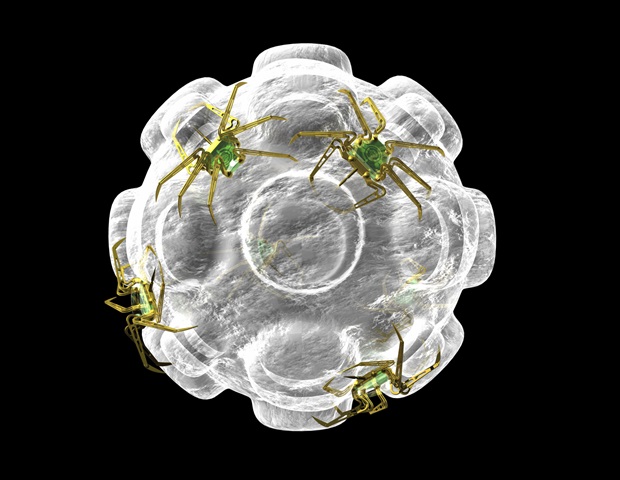Forty-three million Americans lack access to municipal water, and 1 in 10 people globally do not have access to safe drinking water. Rice University’s new WaTER Institute, launched today, aims to address this and other complex water-related challenges.
“Clean water can save more lives than doctors,” said Pedro J. Alvarez , the institute’s director and the George R. Brown Professor of Civil and Environmental Engineering.
The institute’s researchers will also predict and prevent diseases by monitoring wastewater; decrease the amount of energy used to move and treat water in large municipal water systems; predict water-related natural disasters; extract high-value metals with high energy efficiency and low water consumption, and more.
The institute will lead cutting-edge, multidisciplinary research and technological innovation focusing on three key areas: public health, energy transitions and resilient infrastructure. Its full name is the Institute for Clean Water Technologies, Entrepreneurship and Research.
“Rice has strategically increased its investment in research that will positively impact the community, region, nation and world,” said President Reginald DesRoches, “As university president and a civil engineer, I am confident that Rice scientists will make discoveries that transform lives and communities through innovation.”
Researchers will tackle seven major challenges related to water:
- Safe water quality for a growing population
- Distribution between humans and their environment
- Water disaster protection
- Water infrastructure (distribution and collection)
- Enough food for all
- Water to produce energy
- Solutions for water conflicts and a fair share for all
I’m excited to see how the WaTER Institute, drawing from the expertise of institutes and disciplines across campus, develops transformative solutions that economically produce clean water while minimizing energy and chemical requirements. This institute brings together fundamental science, technological innovations and policy. It also promotes a culture of entrepreneurship around water.”
Ramamoorthy Ramesh , executive vice president for research
“The WaTER Institute builds on longstanding partnerships and existing strengths that Rice has in wastewater monitoring, water treatment, nanomaterials development and environmental research,” said Rafael Verduzco , professor and associate chair of chemical and biomolecular engineering and professor of materials science and nanoengineering.
For example, the Houston Health Department, partnering with Rice and Houston Public Works, is a Centers for Disease Control and Prevention National Wastewater Surveillance System Center of Excellence. The wastewater monitoring effort, led by Lauren Stadler, Rice assistant professor of civil and environmental engineering; Loren Hopkins, chief environmental science officer for the Houston Health Department and a professor in the practice of statistics at Rice and Katherine Ensor, the Noah G. Harding Professor of Statistics, helps predict and prevent pandemics by detecting diseases in sewage. The center, dubbed Houston Wastewater Epidemiology, will provide training on wastewater epidemiology to other state and local health departments as well as research on developing statistical tools and metrics to enhance surveillance interpretation.
Qilin Li , one of the institute leaders, has been leading a collaboration with the city to develop decision-making tools to optimize water supply systems, including wastewater reuse for potable water supply to alleviate shortages. Rice scientists also plan to develop virtual testing to improve resilience, minimize energy requirements and prevent degrading water quality associated with water distribution through large, centralized systems.
“The Rice WaTER Institute will provide a much-needed platform for researchers, practitioners, entrepreneurs and policymakers to work together toward a long-term vision for water management that is supported by sound technological solutions,” said Li, professor of civil and environmental engineering and co-director of the Nanosystems Engineering Research Center for Nanotechnology-Enabled Water Treatment with Alvarez.
The researchers will also protect public health through the technologies they are developing to remove contaminants such as endocrine disruptors and PFAS (perfluoroalkyl and polyfluoroalkyl substances) or “forever chemicals” that are breaking through traditional water treatment systems.
“Like other toxic things in our water and environment, PFAS is not going away by itself,” said Mike Wong, a Rice researcher and one of the institute’s leaders. “We need better understanding and better solutions, but we also need better plans on how to get the technology off campus and into the homes, communities and businesses that need help the most. I am excited about all the ways the WaTER Institute can speed up our collective work to create low-cost, no-fuss methods to destroy PFAS.”
Wong is the Tina and Sunit Patel Professor in Molecular Nanotechnology, chair and professor of chemical and biomolecular engineering and professor of chemistry, materials science and nanotechnology, and civil and environmental engineering.
The institute will promote entrepreneurship, specifically startups, for water technologies, Alvarez said. Researchers will collaborate with the Rice Alliance for Technology and Entrepreneurship, the Liu Idea Lab for Innovation and Entrepreneurship and The Ion.
The WaTER Institute’s work will cut across the natural sciences, social sciences, humanities and engineering and connect with Rice’s other research institutes . “Our collaborative structures and culture are a major competitive advantage,” Alvarez said.
This marks the fifth institute Rice has launched over the past year and the eighth to receive additional funding from the university. The other new institutes include the Rice Advanced Materials Institute, Rice Synthetic Biology Institute, Medical Humanities Research Institute and the Rice Sustainability Institute.


